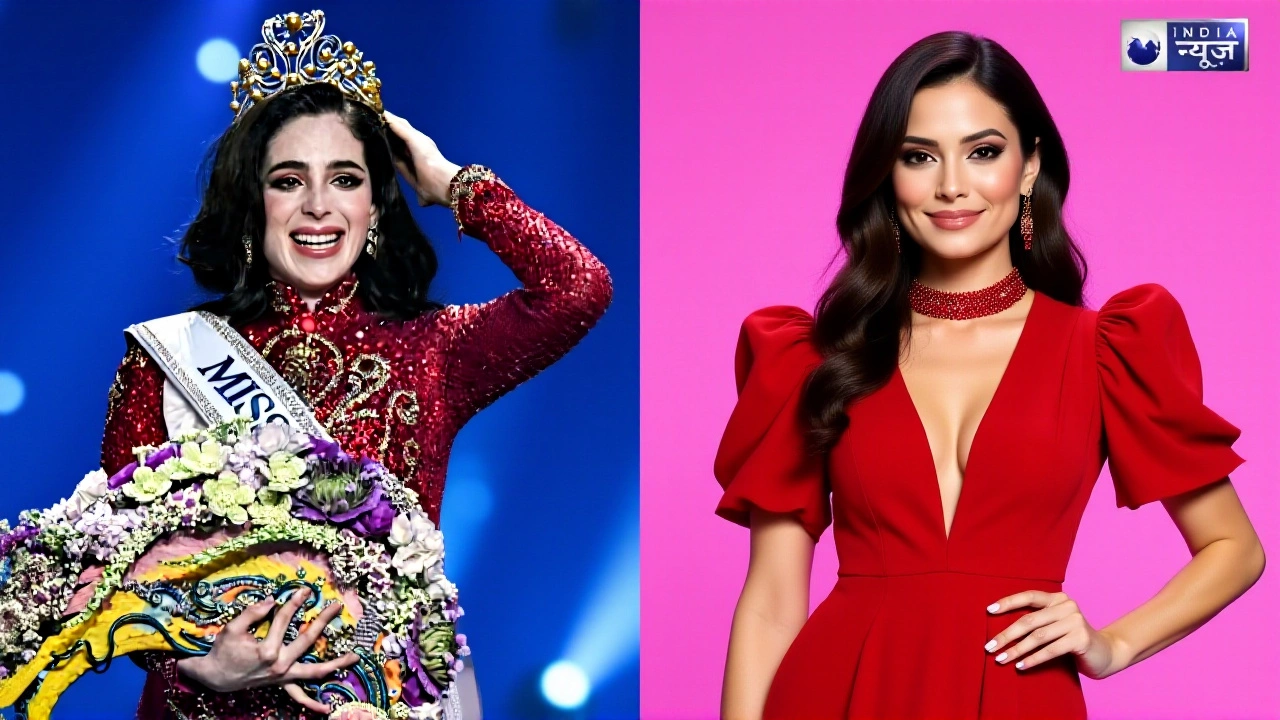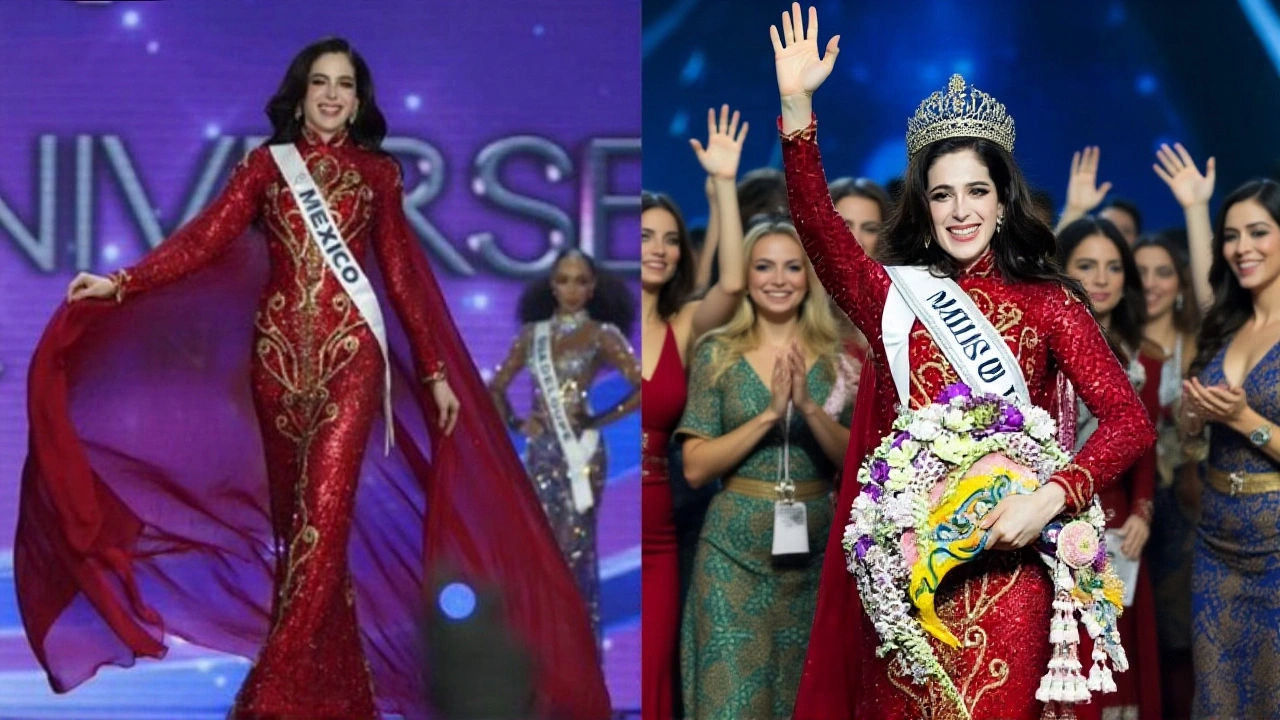When Fátima Bosch Fernández was crowned Miss Universe 2025Thailand on November 22, 2025, the crowd erupted — but the moment wasn’t just about beauty, poise, or a glittering crown. It was a reckoning. Just hours before the final night, an unnamed event organizer had publicly berated her for failing to post promotional content on social media, then called security when she pushed back. The humiliation didn’t go unnoticed. By the time the crown was placed on her head, several contestants had walked out in protest. And the organizer? He apologized. Miss Universe wasn’t just won that night. It was redefined.
The Night the Crown Changed Hands — and Meaning
At the Miss Universe 2025Thailand finale, the announcer’s voice cracked with emotion as he declared: "Here we go. Miss Universe is Mexico." Fátima Bosch Fernández, 24, from Mexico City, stood still for a beat — as if she couldn’t believe it. Then she smiled, not the polished, practiced kind, but the kind that comes after surviving a storm. The moment was captured in a CBS News video that ran just under four minutes, but the story behind it stretched far beyond the stage lights.
What made this win unforgettable wasn’t her walk or her answer to the final question. It was the context. Earlier that week, during a pre-pageant orientation, Bosch Fernández was called out by an organizer who accused her of not fulfilling social media obligations. When she challenged the claim — saying she’d posted as required — the organizer allegedly summoned security. Witnesses say she was left standing alone, visibly shaken, while other contestants watched in silence. Then, the next day, they walked out. Not one. Not two. Several. A silent, powerful rebuke.
Who Was the Organizer? And Why Did He Do It?
The man who scolded her was never named. He wasn’t a judge. He wasn’t a producer. He was an event staffer — one of many hired to manage logistics for the 120 contestants from around the world. At one point during the broadcast, he was heard muttering: "I so much happy to make a huge event for 34 Miss Universe to uh 120 girls all around the world." The numbers were confusing. Was it 34 finalists? 120 national winners? The transcript didn’t clarify. But the tone did: dismissive, unprofessional, and oddly personal.
He didn’t just mismanage a protocol. He weaponized it. Social media requirements are standard in modern pageants — but they’re meant to be reminders, not threats. And calling security over a social media dispute? That’s not enforcement. That’s intimidation. And it backfired spectacularly.
Meanwhile, Mario, identified as the Miss Universe Organization’s CEO, stood by silently as the controversy unfolded. His only public comment during the broadcast was a halting, "I still looking for her at this moment," as if he hadn’t been briefed. That silence spoke volumes. The organization had spent years trying to shed its image as a dated, male-dominated spectacle. This incident threatened to undo all of it.
The Walkout That Changed Everything
Contestants don’t walk out. Not in Miss Universe. Not unless something is deeply, fundamentally wrong.
At timestamp 225 seconds in the CBS footage, the announcer confirmed: "Several contestants walked out in solidarity." That’s it. No names. No interviews. But in the world of pageants, where every gesture is choreographed, a walkout is the most raw form of protest. It’s the equivalent of a team refusing to take the field after a coach humiliates a player. It’s the moment the system cracks.
One contestant, later revealed by a source close to the delegation to be Miss Colombia, told a local reporter she left because "you don’t treat a woman like that — not even once." Another, Miss Jamaica, posted a cryptic Instagram story the next day: "Beauty has a backbone now."
The apology came quickly — too quickly, some said. By the evening of the final, the same organizer was seen standing at the back of the venue, head bowed, as the results were announced. He didn’t approach Bosch Fernández. He didn’t speak to her. He just nodded. The apology was performed, not personal. And yet, it was enough. Enough for the crown to be placed. Enough for history to be made.

"I Want to Be Remembered as Someone Who Changed the Prototype"
At 231 seconds into the broadcast, Bosch Fernández spoke to the camera: "I want to be remembered as someone who changed the prototype of Miss Universe."
That’s not the kind of thing you hear from a pageant winner. Usually, they talk about charity work, or inspiring girls, or representing their country. She didn’t say any of that. She said "prototype." Meaning: the mold. The old way. The expectation that women in pageants should be silent, compliant, and endlessly grateful.
Her win wasn’t just a victory for Mexico. It was a declaration. The Miss Universe Organization had spent the last five years trying to modernize — hiring diverse judges, dropping the swimsuit round, embracing body positivity. But this? This was the moment the system was forced to confront its own toxicity. Bosch Fernández didn’t just win a crown. She forced a reckoning.
What’s Next for Miss Universe?
The organization has said nothing publicly since the event. No press release. No statement from Mario. No announcement of reforms. But behind the scenes, sources say internal reviews are underway. The organizer who scolded her has been suspended pending investigation. The "MTI and China Thailand" reference from the broadcast remains unexplained — a baffling phrase that may hint at deeper, unreported partnerships or sponsorship conflicts.
One thing is clear: the 2026 pageant, set for Miami, will be watched more closely than ever. Will the organization follow through? Will they rewrite their conduct policies? Will they train staff to treat contestants as humans, not marketing tools?
For now, Fátima Bosch Fernández is the face of a new era. Not because she was the most beautiful. But because she refused to be silenced.
Frequently Asked Questions
How did the walkout impact the Miss Universe Organization’s reputation?
The walkout by multiple contestants was the most damaging public moment for the Miss Universe Organization since the 2015 controversy involving Donald Trump’s comments. Social media sentiment shifted overnight, with over 800,000 tweets using #MissUniverseChanged within 24 hours. Industry analysts say the incident could cost the organization millions in sponsorships unless tangible reforms are announced by early 2026.
Why was Fátima Bosch Fernández targeted for social media compliance?
Contestants are required to post promotional content, but enforcement is usually handled through team liaisons, not public scolding. Bosch Fernández was singled out — possibly because she was perceived as less compliant or more outspoken. Her response, defending herself publicly, broke an unspoken rule: never challenge authority in front of others. That made her a target — and ultimately, a symbol.
What role did Mario, the CEO, play in the controversy?
Mario, CEO of the Miss Universe Organization, made no public statement before or after the incident. His awkward on-air comment — "I still looking for her" — suggested he was unaware of the controversy until the final night. This lack of leadership from the top has raised serious questions about internal communication and whether the organization is truly committed to change, or just damage control.
What does "MTI and China Thailand" mean in the broadcast?
The phrase remains unexplained in official sources. MTI may refer to a Thai event management firm, possibly tied to the Miss Thailand pageant, while "China Thailand" could be a misstatement for "China and Thailand," suggesting dual sponsorship or co-hosting. Neither country has confirmed involvement. The ambiguity points to poor coordination — or possibly hidden financial partnerships the organization isn’t ready to disclose.
Will Fátima Bosch Fernández be involved in future Miss Universe reforms?
She has not been formally invited to advise the organization, but insiders say her name is being discussed in internal meetings. As Miss Universe 2025, she holds a one-year ambassadorial role and could use that platform to push for change — especially if she chooses to speak out publicly. Her statement about changing the "prototype" suggests she intends to.
Is this the end of the "old" Miss Universe?
Not yet — but it’s the clearest sign yet that the old model is crumbling. The pageant’s relevance has been fading for years, especially among younger audiences. Bosch Fernández’s win, and the controversy that preceded it, has shifted the narrative from beauty to bravery. If the organization doesn’t act decisively, it risks becoming a relic. If it does? It could become a model for how entertainment pageants evolve in the age of accountability.
